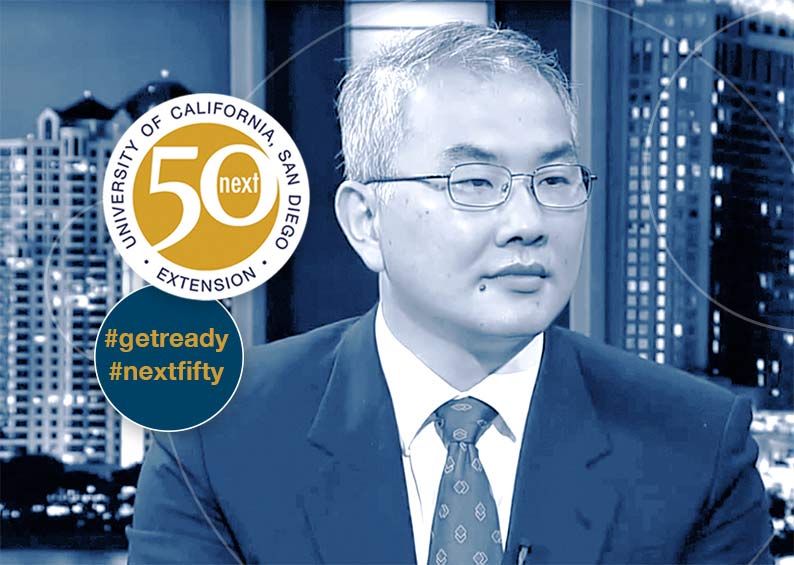
In honor of UC San Diego Extension’s first 50 years, 50 Voices of the Future asks thought leaders about the trends, breakthroughs and social advances they foresee over the next 50 years.
Trying to kill off a cancerous brain tumor is like playing chess. “You make a move; the tumor makes a move,” says Dr. Clark Chen, co-director of
neurosurgical oncology at
UC San Diego. “In order to win a chess game, you can’t rely on only one or two moves.” Lately Dr. Chen has been studying a particularly virulent strain of brain cancer called
glioblastoma. And in his ongoing attempts to checkmate the disease, he and his colleagues are using a clever new maneuver called viral gene therapy. The treatment involves injecting the brain with a virus that can track and kill off the cancer. Chen, whose work has earned him countless awards and national recognition, is proud of the advances that he and his UC San Diego colleagues are making. “We are poised to transform the care of brain tumor patients in this entire region,” he says.
Why is the work you do important?
The focus of my clinical work and my research is on a form of tumor called glioblastoma. This is the most common form of adult brain cancer. It remains a very aggressive disease. The median survival is about 14 months and most patients die within two years of diagnosis. The tumor is very invasive. Even in areas where you don’t see the tumor, there’s microscopic disease – microscopic tumors. Surgeons can’t operate on things they can’t see. One of the major developments we’re working on is a virus that tracks brain tumors. If I were to inject the virus into the tumor, the virus will replicate and spread so that it follows the microscopic tumors that we cannot operate on. And then the virus destroys the cancer –
viral gene therapy. That’s one of the major clinical trials we’re carrying out here. Localized viral therapy can avoid all the side effects of chemotherapy. We can put anything into the virus. The virus is like a missile. You put different things into the missile and deliver it into the tumor. This will allow us, eventually, to make multiple moves against the tumor. This is an ongoing clinical trial. Another aspect of work we’re doing is to understand why certain patients do benefit from this type of viral therapy and which patients don’t. We do this in collaboration with a company called
Tocagen, which sponsors this trial.
What are the influential/exciting developments happening in your field now and why?
One of the most exciting recent advances is the potential impact on immunotherapy. It turns out when the virus delivers its drug, it actually triggers an immune response. The virus itself actually facilitates your body’s immune response, so one of the most exciting discoveries in recent years in oncology is the importance of the immune system in helping our body fight off cancer. And the viral therapy leverages our innate immune response. When you are infected with the flu, your body exerts a certain response to try to clear the virus. Similarly, when this virus is injected into the brain, the virus selects an immune response that helps your body fight off the tumor as well.
What’s the next big thing?
Within oncology, one major step forward will be that we will match the correct surgery to the right patient. People like to talk about precision medicine, matching the right medicine to the right disease. The concept applies equally well to surgery. We need to tailor the type of surgery done to the patient’s condition, the patient’s type of tumor, the molecular profile of the tumor. For some patients, having a big surgery might be the right thing. For others, maybe a viral injection is best. Let’s not do the same surgery for everybody.
How big an impact will your field play in shaping the future of the San Diego region and beyond?
UC San Diego has the only dedicated neuro-oncology team in the region of San Diego. We treat only brain tumor patients. And we specialize so that we can think carefully about the latest developments, so we’re not behind the eight ball. We’re always incorporating the latest data, the latest discoveries into our standard of care. Because of the advances that we make here – because of our dedicated specialists – we are poised to transform the care of brain tumor patients in this entire region. We are setting a paradigm.
Hop into your time machine…what does the future look like for this field in 50 years? How can individuals/companies get prepared for what’s next?
Fifty years from now we will be able to use advanced imaging tools to help us decide what kind of tumor we have. We’re already moving in that direction, developing tools that allow us to assess the molecular biology and histology in real time. So if someone could tell me the molecular profile of the tumor in real time, I could adjust my surgery in real time so that different types of surgeries will ultimately be performed for different types of patients.
Explore the Sciences and Healthcare programs and courses that UC San Diego Extension offers including a range of certificate programs in areas such as Clinical Trials and Biotechnology Project Management, and discover more about neuroscience on The Brain Channel on UCTV.